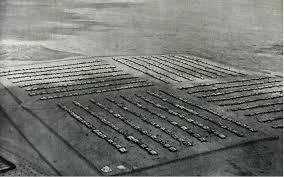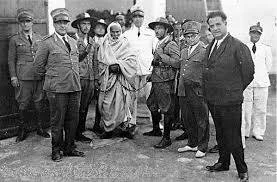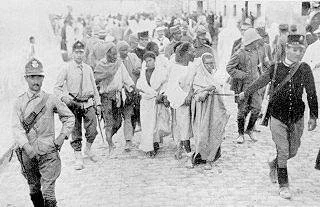Forgotten Genocide
“I have no illness but this place of Egaila,
the imprisonment of my tribe
and separation from my kin’s abode.”
– Rajab Hamad Buhwaish al-Minifi
These words come from one of the few surviving testimonies of the Libyan genocide under Italian rule, written in poetry, carried by memory, and passed down through oral tradition. They reflect not just an individual’s grief, but a collective cry from a people erased from mainstream history.
As we witness the genocide of Palestinians unfold in real time on our screens, for many, it is a moment of reckoning, a confrontation with the historical legacies that enabled such violence to become possible, even normalized. Genocide, settler colonialism, and the dehumanization of entire populations are not exceptional moments in history; they are systemic patterns. They are the architecture of empire.
As a Libyan woman born and raised in Canada, I grew up hearing echoes of my family's own colonial trauma, though often in fragments—in the way elders spoke about “the Italians,” in the silences around certain memories, in the poetry recited at gatherings. It is only recently, as I’ve tried to make sense of the brutal violence in Palestine, that I’ve begun to seriously confront Libya’s own erased genocide. The more I learned about Britain’s role in facilitating Zionist settler colonialism in Palestine, the more I found myself asking: What has colonialism done to us?
Between 1911 and 1943, Libya was violently colonized by Italy. Initially dismissed by Europeans as nothing more than a “pocket of sand,” Libya was in fact a deeply rooted society—governed by local Islamic and North African institutions, and animated by the brilliant Senussi movement, a spiritual and political force that organized resistance and community education across the Maghreb.
Italy’s fascist regime, under Mussolini, had no interest in indirect rule. Libya was to be emptied, pacified, and repopulated. In the 1920s and 30s, the regime orchestrated the forced displacement of roughly 110,000 people from Eastern Libya. Families, scholars, and entire communities were marched from the lush Green Mountains into the deserts of Sirte. There, they were imprisoned in at least 16 concentration camps—five of which were death camps in all but name. They were starved, exposed to illness, stripped of dignity, and forgotten.
By 1934, only around 30,000 remained. The rest had perished—some from hunger, some from disease, and many from despair. When the survivors were finally released, they found their lands had been settled by Italian colonists. The ecological devastation was just as severe: the herds that sustained their way of life were decimated. Eastern Libya had lost nearly half of its population.
And yet how many people know this ever happened?
The genocide in Libya has been erased from modern scholarship. Most victims were illiterate, and their stories were preserved not in textbooks or government documents, but in poetry, oral storytelling, and memory. These modes of resistance, local, indigenous, and collective, were seen as illegitimate by colonial archivists and Western academics. Genocide studies, rooted in Eurocentric narratives, have long privileged written documentation, legal language, and European frameworks of suffering. In doing so, they have ignored the crimes of colonial powers like Italy.
This is why we must revise and decolonize genocide studies. The Holocaust, while a horrific and singular event, is not unique in its horror. Genocide did not begin or end with it. The same colonial models that produced death camps in Europe were first tested in places like Congo, Namibia, and Libya.
Italian fascism was not a "lesser evil." It was not benign. And the Libyan genocide proves this.
Sources:
Ahmida, A. A. (2021). Genocide in Libya: Shar, a hidden colonial history. Routledge.
Ahmida, A. A. (2024). Confronting silence and cover-up of the colonial genocide in Libya: Researching Italian fascism from the standpoint of its victims. Comparative Studies of South Asia, Africa and the Middle East, 44(3), 391–395. https://doi.org/10.1215/1089201X-11470415
Kiernan, B., Lower, W., Naimark, N., & Straus, S. (Eds.). (2023). The Cambridge world history of genocide: Volume 3, Genocide in the contemporary era, 1914–2020. Cambridge University Press.




